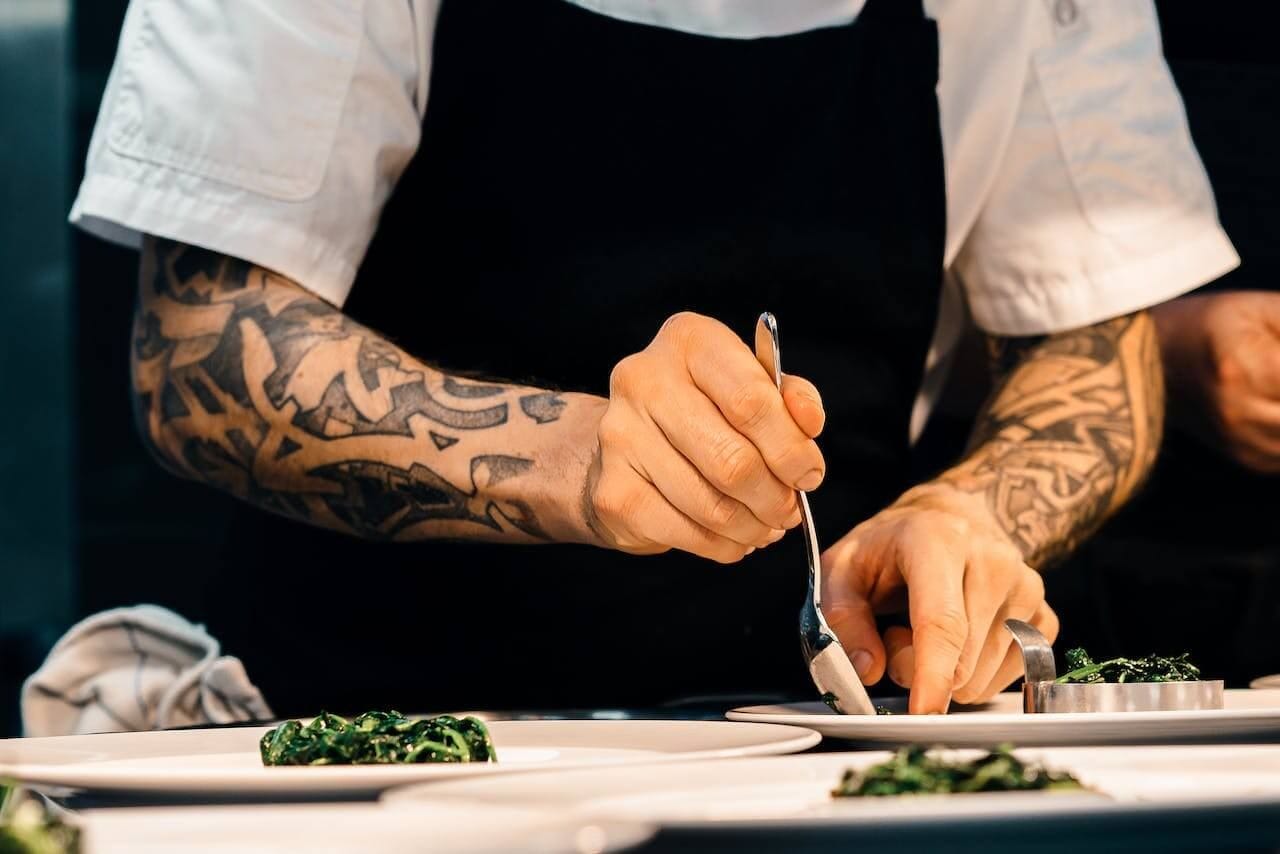Access thousands of exclusive scholarships
for free
If you dream of becoming a professional chef, choosing the best culinary school is the first step towards achieving that goal. Imagine yourself in front of a stove, creating exclusive delicacies for patrons and respected industry professionals.
They say the way into someone's heart is through their stomach, and a quality culinary education can provide you with the proper skills and knowledge to excel in the highly competitive world of food.
In this article, we will discuss the importance of culinary education and its roles in future careers and look at the top 10 culinary schools that have established themselves as the best institutions for aspiring chefs.
So, if you love to cook, have a passion for it, or have even taken it up as a hobby that is slowly becoming your dream job, you've come to the right place. And who knows? You, too, could become a top chef coming straight out of culinary training!
Do you have creative aspirations like culinary arts? Create a free Bold.org profile and apply for scholarships for the arts today!

A Look at the Top 10 Culinary Schools
Let's explore the top 10 culinary schools of our choice below.
The Culinary Institute of America
The Culinary Institute of America (CIA) is widely known as one of the world's premier culinary institutions. With campuses in Hyde Park, New York; St. Helena, California; San Antonio, Texas; and Singapore, the CIA offers a range of programs for aspiring chefs.
Their curriculum covers all aspects of the culinary arts, including the baking arts and pastry arts, culinary science, and wine and beverage studies. The CIA also offers state-of-the-art facilities and professional-grade kitchens, allowing students to practice their skills in a real-world setting.
What sets the CIA apart is its deep network of alumni, who have gone on to be great successes in the culinary industry. This network provides invaluable mentorship and job placement opportunities for CIA graduates.
Le Cordon Bleu
Le Cordon Bleu is a renowned French culinary school with a rich history dating back to 1895. With campuses in Paris, London, Tokyo, and various other locations around the world, Le Cordon Bleu offers a true-to-scale international culinary experience.
LCB's programs emphasize classic French culinary techniques and cover a wide range of disciplines, including cuisine, patisserie, and boulangerie. Students have the opportunity to learn from master chefs who are experts in their respective fields, as well as with them in the school's setting.
Le Cordon Bleu is also known for its rigorous training and high standards, contributing to its esteemed reputation in the culinary world. Graduates of Le Cordon Bleu often find themselves in prestigious positions in top restaurants and hotels worldwide.
Institute of Culinary Education
The Institute of Culinary Education (ICE) has been a leader in culinary education since its establishment in 1975. Located in the heart of New York City, ICE offers a diverse range of culinary degree programs designed to cater to various interests and career goals.
What sets ICE apart is its emphasis on hands-on learning and real-world experience. Students have the opportunity to work in ICE's professional kitchens, honing their skills under the guidance of experienced chef-instructors, as well as join their comprehensive culinary programs.
ICE offers specialized courses in topics such as wine studies, culinary and hospitality management, and food media. This allows students to customize their education and gain expertise in specific areas of interest.
Johnson & Wales University
Johnson & Wales University (JWU) has a long-standing reputation for excellence in culinary education. With campuses in Providence, Rhode Island; North Miami, Florida; Denver, Colorado; and Charlotte, North Carolina, JWU offers a comprehensive range of culinary programs.
JWU has a unique approach to culinary education, which integrates academic coursework with hands-on training. The university's experiential learning model allows students to apply their knowledge in real-world settings, preparing them for success in the industry.
JWU is also known for its strong connections with industry partners, which provide students with valuable internship and job placement opportunities. This network ensures that JWU graduates are well-prepared to enter the culinary field.
The French Culinary Institute
The French Culinary Institute (FCI), located in New York City, is known for its intensive culinary programs. FCI offers both professional and amateur degree programs, catering to individuals with varying levels of culinary experience.
What sets FCI apart from culinary colleges is its industry-focused curriculum. Students receive hands-on training from expert chef-instructors, learning essential techniques and skills necessary for the industry. FCI also emphasizes the importance of professionalism and culinary entrepreneurship, preparing students to thrive in the culinary business world.
The close relationship between FCI and its industry partners also allows students to access valuable networking opportunities and internship placements, ensuring a seamless transition into the culinary industry. Remember, sometimes, who you know matters, too, so use your resources and network.
Kendall College School of Culinary Arts
The Kendall College School of Culinary Arts, located in Chicago, Illinois, has been a leader in culinary education for over 30 years. Kendall College offers a comprehensive range of culinary programs, including associate degrees, bachelor's degrees, and certificate programs.
One of the notable aspects of Kendall College is its focus on sustainability and farm-to-table practices. Students learn the importance of sourcing local, seasonal ingredients and gain hands-on experience through their rooftop garden and culinary labs.
Kendall College's close ties to metropolitan community college and to the Chicago culinary scene provide students with numerous networking opportunities and access to some of the best restaurants and hotels in the city.
The Art Institutes
The Art Institutes is a network of culinary schools located across the United States in major culinary cities like New York, Los Angeles, and Chicago. The Art Institutes offer a variety of culinary programs designed to prepare students for careers in the culinary industry.
Their programs encourage students to think outside the box and experiment with flavors and techniques. With access to state-of-the-art facilities and culinary labs, students can bring their culinary visions to life.
The Art Institutes also emphasize career development, providing students with internship opportunities and industry connections. These partnerships ensure that graduates are well-prepared for the competitive culinary job market.
Sullivan University National Center for Hospitality Studies
Sullivan University National Center for Hospitality Studies, located in Louisville, Kentucky, offers comprehensive culinary programs designed to equip students with the skills necessary for success in the culinary industry.
One of the key features of Sullivan University is its industry-experienced faculty members. A team of seasoned chefs and industry professionals provide students with personalized instruction and mentorship, ensuring they receive a well-rounded culinary education.
The university also has state-of-the-art facilities, including professional-grade kitchens and a student-operated bakery and café.

What Sets These Schools Apart
Every single one of these culinary schools has its own unique features that set them apart from the rest. Experiencing these programs and educational teachings will not only give you some of the best, top-of-the-line teachings but also help you build your own unique set of skills along the way.
Check out these unique features from some of the best cooking schools in the US.
Unique Features of Culinary Schools
- The Culinary Institute of America stands out for its extensive alumni network, providing graduates with unparalleled opportunities in the culinary industry.
- Le Cordon Bleu's rich history and reputation for excellence in French cuisine make it an attractive choice for aspiring chefs looking to master classic culinary techniques.
- The Institute of Culinary Education's emphasis on hands-on learning and real-world experience sets it apart from other institutions.
- Johnson & Wales University's experiential learning model integrates academic coursework with practical training, giving students a well-rounded education.
- The French Culinary Institute's industry-focused curriculum prepares students not just as chefs but also as culinary entrepreneurs.
- New England Culinary Institute's emphasis on farm-to-table cuisine and sustainable practices prepares students to meet the demands of the industry.
- The Art Institutes' focus on creativity and innovation encourages students to develop their unique culinary style.
- Sullivan University National Center for Hospitality Studies' industry-experienced faculty and a strong network of industry partners provide students with invaluable mentorship and job placement opportunities.
Get Matched to Thousands of Scholarships
Create your Bold.org profile to access thousands of exclusive scholarships, available only on Bold.org.
Create Free ProfileTeaching Methods and Curriculum
When it comes to teaching methods and curriculum, these top culinary schools offer a combination of theoretical knowledge and practical training. Most culinary programs include hands-on cooking classes, which is the best way to learn.
Their programs allow students to learn various cooking techniques, food preparation, and plating. They often have professionally equipped kitchens to simulate a real-world culinary environment.
Along with cooking classes, culinary schools also offer theoretical courses covering topics such as nutrition, food safety, restaurant management, and menu planning.
These courses provide students with a well-rounded understanding of the culinary industry, and while culinary programs through community college may also offer hands-on training, they may not offer specialty courses like pastry arts, baking, and international cuisines.
Opportunities for Real-World Experience
Along with expert technique and learning mechanisms, probably the most beneficial part of culinary education is the opportunity to gain real-world experience. Many culinary schools have partnerships with local restaurants, hotels, and catering companies, providing students with hands-on learning opportunities.
They also provide internship opportunities for students to work in professional kitchens and gain practical skills under the guidance of experienced chefs. This experience not only enhances their culinary abilities but also provides valuable industry connections.
Also, remember that your culinary degree can take you places outside of the kitchen. For instance, if one day you want to transition into caterer, restauranteur, or even hospitality management, a culinary school education can help lead you to high places in back-of-the-house positions. Getting a culinary educational experience can open not one but many doors that lead to success.
It allows students to acquire culinary skills, learn how to work in a kitchen setting, and truly understand the dynamics of a professional kitchen. It's a one-of-a-kind experience you want to have as an industry professional. And that is something you won't find on a regular menu.

The Impact of Culinary Education
But cooking is easy, right? Anyone can do it, which is true! Anyone can cook, but to be a master chef, you have to learn the culinary basics, essentials, and everything in between. That is why culinary education is important for aspiring chefs.
Though some may argue that real-world experience is enough to succeed in the culinary industry, a formal education can truly set you apart from the rest and enhance your career prospects. It will also provide you with its own experience that will help you grow as a student and chef. Let's talk about it.
Firstly, in order to prepare yourself for culinary school, you have to get familiar with their comprehensive curriculum that covers a wide range of subjects like culinary techniques, including food preparation, cooking methods, pastry arts, and menu planning.
These programs are designed to make sure you have a solid foundation of culinary knowledge to build upon and often provide valuable networking opportunities.
It pays to know people, and the culinary school can introduce you to industry professionals, guest chefs, and fellow students who not only share your passion for food but can also introduce you to internships, apprenticeships, and professional opportunities.
Culinary schools also offer hands-on training in professional-grade kitchens, which all professional chefs need. This immersive experience allows students to practice their skills under the guidance of experienced instructors.
It ensures they develop the precision and attention to detail required in a high-pressure kitchen environment and is a plus. You will also know what a clean kitchen is supposed to look like.
The Role of Culinary Schools in a Chef's Career
Like we said before, even though some will oppose going to culinary school, there's no denying the role a good culinary education plays in shaping the careers of aspiring chefs.
A top, best culinary school can provide students with a structured learning environment that you can't learn in a kitchen. This space is where chefs develop their culinary skills and gain a deep understanding of the culinary arts amongst peers and their master chefs.
But learning with a real kitchen isn't the only benefit of one of these degree programs; one of the main advantages of attending culinary school is the mentorship provided by experienced faculty members who are also chefs. These instructors bring valuable industry insights to the table, sharing their expertise while helping students hone their techniques.
This kind of guidance is exclusive to top culinary schools, along with acquiring technical skills from them. Culinary schools focus on developing students' creativity and palate in all areas of culinary. Through experimentation and exposure to a wide variety of ingredients, students learn to innovate and create unique culinary masterpieces.
Key Factors to Consider When Choosing a Culinary School
Culinary and hospitality management programs offer aspiring student many opportunities and advancements for their future careers, but how do you know which culinary school is right for you? Don't stress. Bold.org is here for you. Let's explore some key factors you should consider when choosing a culinary school.
Accreditation is also another key factor (and one of the more overlooked factors) to look for in a culinary school. Accredited institutions meet specific standards of quality and have been recognized by industry organizations, ensuring that your education is designed by potential employers. Making sure the accreditation is up to par will ensure a quality journey to your culinary school degree.
Curriculum, courses, and costs are other important factors when looking at culinary institutions. You want to look for programs that cover a wide variety of culinary topics and provide a balance of theoretical knowledge and practical training, as well as budget.
Don't just settle for any culinary school. Compare tuition fees, financial aid options, and potential return on investment for your future career.

Frequently Asked Questions About the Best Culinary Schools
Do you have to go to culinary arts school?
It has been said that you don't necessarily need a culinary arts education, but with an education in culinary arts, you have the opportunity to learn food fundamentals and unique techniques, grow and perfect your skills, learn from industry professionals, and much more.
Going to culinary school is the guiding bridge between student and master chef, so though you don't have to, we highly recommend giving this decision a second thought.
What can you do with a culinary degree?
Along with being a top chef, having a culinary degree can open doors for you in a professional development setting. If you prefer leading a team, you'd want to think of hospitality management and possibly ownership if you dream of having your own restaurant. The sky is the limit in the food service industry with a culinary degree. You just have to find what best suits you.
What is the best culinary arts degree program?
While there are many top-notch culinary arts institutes, the best culinary arts degree program should meet all of your aspirations and professional goals you have for your future. Each program offers its own unique set of features that help bring for an immersive and specific experience that fits your goals.
If you're thinking of going to culinary school, we recommend doing extensive research on these days, familiarizing yourself with their curriculum and offerings, and choosing a school that will take you to new levels of success.
Don't forget to visit our Scholarship Blog and create a profile to access some of the most exclusive scholarships out there. Get started on your journey to higher education!


